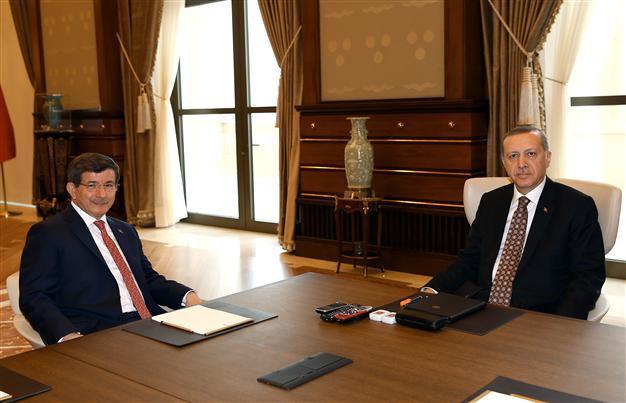President Erdoğan to chair Cabinet in 2015
ANKARA

Prime Minister Davutoğlu and President Erdoğan during their weekly meeting. DHA Photo
Turkish President Recep Tayyip Erdoğan will begin chairing meetings of the Cabinet in the upcoming year, one of his close aides has announced, while ruling out any conflict of authority between the president and the prime minister.“Fifty-two percent of this nation voted for our president. Although he doesn’t have a certain responsibility within the constitutional framework, he is politically responsible to society,” said ruling Justice and Development Party (AKP) İzmir deputy Binali Yıldırım, a long-time political comrade of Erdoğan.
Yıldırım's remarks came in an interview with the private NTV news station on Dec. 11 when he was reminded of the main opposition Republican People’s Party’s (CHP) objection to Erdoğan’s engagement in the debate over the possible inclusion of Ottoman language classes in Turkey’s high school curriculum, arguing that such issues were not part of the president’s purview.
“I don’t know why it is found odd when he, as the head of the state, as the chief commander of the army and, according to the occasion, as the head of the Council of Ministers, discloses and expresses his view in fields that concern society,” Yıldırım added.
“During election rallies, he openly told the nation that he would do this, and the nation voted for that,” he said.
Yıldırım, a former minister of transport, maritime affairs and communications, has been closely working with Erdoğan as a senior adviser since the latter was elected to his current post in August.
Recalling that Erdoğan had recently signed a decree that changes the institutional structure of the presidential office, NTV asked whether this would lead to a conflict of authority between the president and the government, as it was considered a move aimed at establishing a “shadow Cabinet” that will work under Erdoğan and monitor the work of the Cabinet led by Prime Minister Ahmet Davutoğlu.
“No, it won’t happen. If this happens, then weak governance would occur,” Yıldırım replied, adding that the Constitution clearly outlined all the authorities of the president.
“If acts are taken in line with those provisions, then there will no confrontation at all,” he said. “But this is a matter of style and the president announced his style of practicing the presidency.”
Refuting suggestions that the institutional reorganization of the presidency was actually paving the way for “a second Council of Ministers,” Yıldırım said: “When needed, the president gathers the Cabinet anyway. I suppose he will begin this practice in the new year.”
Since the election, Erdoğan has refused to shy away from displaying his aspirations to chair Cabinet meetings, constantly arguing that this was a constitutional right granted to the head of the Turkish state.
In contending so, Erdoğan and his inner circle rely on Article 104 of the Constitution which outlines the duties and powers of the president. Among the duties and powers relating to executive functions, the Constitution lists “presiding over the Council of Ministers or calling the Council of Ministers to meet under his or her chairmanship whenever he or she deems it necessary.”
The current 1982 Constitution is effectively a legacy of the Sept. 12, 1980, coup, and it granted “executive power” to the 1980 military coup leader, Kenan Evren.
Kalın spokesperson for presidency
Earlier this week, a decree paved the way for the increase of the number of directorate-generals in the presidential office from four to 13. The previous departments were in charge of administrative and financial affairs, institutional communication, information technologies and human resources. The new departments will be in charge of a wide range of affairs such as homeland security, external relations, economy, defense, investment monitoring, energy and social affairs.
Only two days after the reorganization, Erdoğan appointed Ambassador İbrahim Kalın, who was serving as deputy secretary-general at the presidential office, as his spokesperson.
“The spokesperson for the presidency will be able to make assessments concerning the agenda when required in addition to being able to make statements on behalf of the president,” Lütfullah Göktaş, chief press adviser for Erdoğan, said in a statement delivered on Dec. 11.
“The formation of the spokesperson’s office is an important step with regard to a healthier communication with the public,” Göktaş said, as no spokesperson’s office had earlier been outlined in related circulars about duties, authorities and responsibilities of the Secretariat-General of the Presidency.
Before working as deputy secretary-general at the Presidency, Kalın served as the deputy undersecretary at the Prime Ministry.
Kalın worked as general coordinator of the Foundation for Political, Economic and Social Research (SETA), a think tank known to be close to the AKP, between 2006 and 2009, before beginning to work at the Prime Ministry.
















